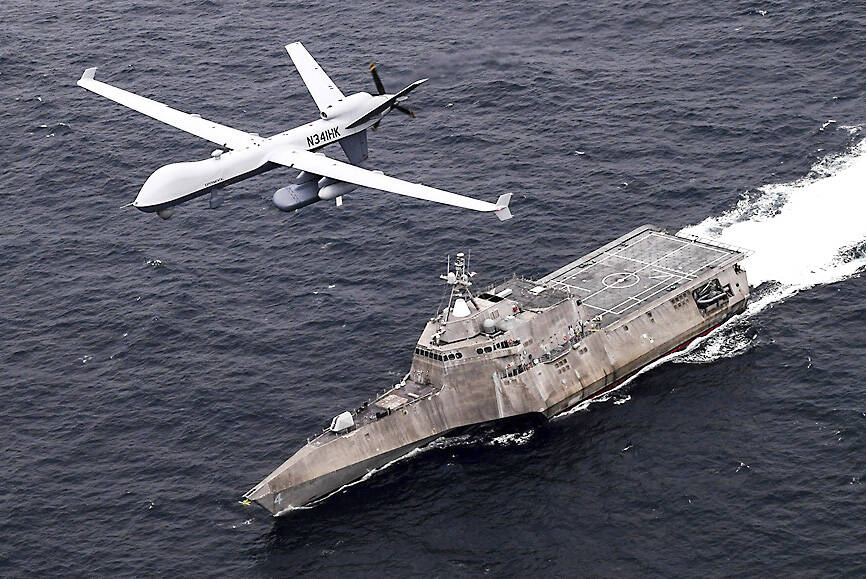Taiwan must revamp its defensive strategy to protect critical infrastructure from uncrewed aerial vehicles (UAV), a Marine Corps officer wrote in the Institute for National Defense and Security Research newsletter.
Drones have played a significantly larger role in the Russia-Ukraine conflict than previously expected, with both sides waging a campaign of drone strikes against their adversary’s infrastructure, Lieutenant Colonel Chang Tzu-hung (張子鴻), a visiting military fellow at the institute, wrote on Aug. 8.
The conflict has underscored that UAVs possess many benefits as weapons systems, including their range, maneuverability and ability to strike from varying altitudes, Chang said, adding that the importance of anti-drone warfare has increased accordingly.

Photo: US Navy / Chief Mass Communication Specialist Shannon Renfroe via AP
Crucial infrastructure protection refers to defensive measures taken to preserve the parts of a country’s infrastructure that are most essential to the maintenance of a functioning government, the armed forces, the national economy and morale, he said.
While the Taiwanese military was apparently successful in defending key infrastructure against simulated air raids and other forms of attacks in this year’s Han Kuang military exercises, techniques still need to be refined to handle the use of UAVs in gray zone activities, he said.
South Korea, vaunted as the world’s sixth most powerful military, proved incapable of dealing with North Korean drones during a large scale incursion that took place in December last year, Chang said.
Drones from the North flew in and around South Korea’s airspace, disrupted more than 30 flights at the Incheon and Gimpo international airports and caused considerable public alarm, he said.
South Korea’s failure to respond to the drones effectively in large part stemmed from a reluctance to employ soft or hard-kill weapons against the UAVs because of the fear that downed drones could result in collateral damage in residential areas, Chang said.
This proves that defending units must have the confidence to take decisive action without delay, and be given clear guidelines with which to assess the risks associated with the loss of civilian lives and property, escalation and the threat the drone might pose to the facility being defended, he said.
The dangers of inaction have to be balanced against the dangers of action such as harming civilians or escalating the situation, Chang added.
Alarmingly, most of Taiwan’s critical infrastructure is in or near urban centers, and the authority to make security arrangements for many strategically valuable facilities falls on civilian agencies without the necessary expertise to create such guidelines, he said.
In addition, drone attacks do not need to destroy a target to achieve an effect in war, as disrupting the normal operations of a key facility is enough to undermine the adversary’s ability to conduct military operations and sustain civilian morale, he said.
In light of these factors, the armed forces’ counter-drone measures cannot be said to be reliably effective, particularly with regard to fending off attacks by small or medium-sized UAVs, Chang said.
The military is urged to explore the specific methods used for identification and tracking, threat reporting, and warning and defense fire with an eye toward shortening the kill chain, he said, referring to the response time between detecting and destroying a threat.
Integrating an algorithmic technology that can automatically identify enemy drones from the input of radar, infrared and optical sensors would be a potential solution to dealing with the UAV threat, Chang said.

Taiwan is stepping up plans to create self-sufficient supply chains for combat drones and increase foreign orders from the US to counter China’s numerical superiority, a defense official said on Saturday. Commenting on condition of anonymity, the official said the nation’s armed forces are in agreement with US Admiral Samuel Paparo’s assessment that Taiwan’s military must be prepared to turn the nation’s waters into a “hellscape” for the Chinese People’s Liberation Army (PLA). Paparo, the commander of the US Indo-Pacific Command, reiterated the concept during a Congressional hearing in Washington on Wednesday. He first coined the term in a security conference last

Prosecutors today declined to say who was questioned regarding alleged forgery on petitions to recall Democratic Progressive Party (DPP) legislators, after Chinese-language media earlier reported that members of the Chinese Nationalist Party (KMT) Youth League were brought in for questioning. The Ministry of Justice Investigation Bureau confirmed that two people had been questioned, but did not disclose any further information about the ongoing investigation. KMT Youth League members Lee Hsiao-liang (李孝亮) and Liu Szu-yin (劉思吟) — who are leading the effort to recall DPP caucus chief executive Rosalia Wu (吳思瑤) and Legislator Wu Pei-yi (吳沛憶) — both posted on Facebook saying: “I

The Ministry of Economic Affairs has fined Taobao NT$1.2 million (US$36,912) for advertisements that exceed its approved business scope, requiring the Chinese e-commerce platform to make corrections in the first half of this year or its license may be revoked. Lawmakers have called for stricter enforcement of Chinese e-commerce platforms and measures to prevent China from laundering its goods through Taiwan in response to US President Donald Trump’s heavy tariffs on China. The Legislative Yuan’s Finance Committee met today to discuss policies to prevent China from dumping goods in Taiwan, inviting government agencies to report. Democratic Progressive Party Legislator Kuo Kuo-wen (郭國文) said

Sung Chien-liang (宋建樑), who led efforts to recall Democratic Progressive Party (DPP) Legislator Lee Kun-cheng (李坤城), was released on bail of NT$80,000 today amid outcry over his decision to wear a Nazi armband to questioning the night before. Sung arrived at the New Taipei District Prosecutors’ Office for questioning in a recall petition forgery case last night wearing a red armband bearing a swastika, carrying a copy of Adolf Hitler’s Mein Kampf and giving a Nazi salute. Sung left the building at 1:15am without the armband and covering the book with his coat. Lee said today that this is a serious